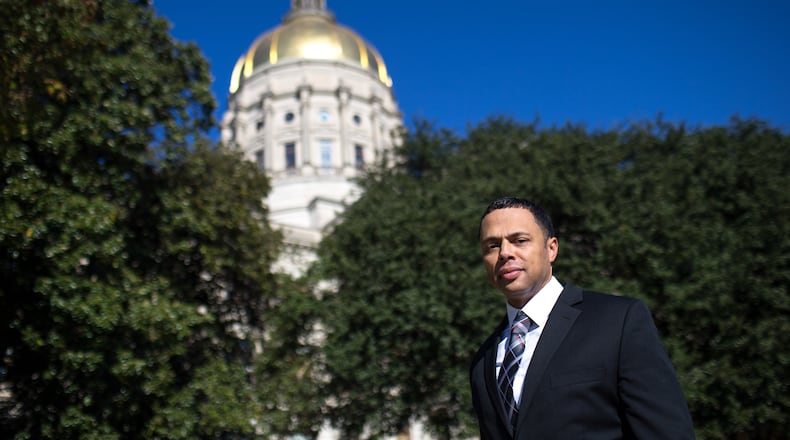A week before Christmas, a group of Republican men and women of proven loyalty will gather in the state Capitol to cast the only Georgia votes in the 2016 presidential contest that constitutionally matter.
Back in August, one prospective member of the state's Electoral College had balked at the prospect of voting for a President Donald Trump. But he was quickly replaced.
So the New York businessman will get all 16 of Georgia’s electoral ballots, thanks to his 51 percent to 46 percent victory over Democrat Hillary Clinton here.
It didn’t have to be this way.
Only a few months ago, the state Legislature had before it two bills that, on paper, were among the most popular of the 2016 session. Each measure, Republican-driven in both the House and Senate, would have pledged Georgia’s Electoral College votes to the presidential candidate who wins the most popular votes.
Had that pledge been in effect six weeks ago, Georgia electors on Monday, Dec. 19, would be voting for Clinton, who leads Trump by 2.5 million in the popular vote. It’s the biggest winning margin by a losing presidential candidate in U.S. history.
But both House Bill 929 and Senate Bill 376 hit mysterious, invisible walls as last winter edged toward spring. The former received approval from a House committee and then disappeared. According to its primary sponsor, S.B. 376 had the signatures of 50 senators – in a chamber with only 56 members. The bill never even got a hearing.
“I suspended my support of the bill in an effort to better understand the issue,” said David Shafer, R-Duluth, who as Senate president pro tem is the chamber’s ranking member. “We have received new data and I no longer support the bill.”
Shafer didn’t specify what the new data was. Presumably, it includes Trump’s Nov. 8 victory – and perhaps polling data as well.
In 2011, 54 percent of Republicans and GOP-leaning independents favored a constitutional amendment to subject presidential contests to a popular vote. By last week, that support had dropped to 19 percent, according to the Gallup organization.
But growing GOP antipathy to a popular-vote presidency preceded Trump’s win. At its national convention in Cleveland in July, Republicans included in their platform a condemnation of the national vote movement that Georgia had considered joining only months earlier. Not only is it “unconstitutional,” according to RNC delegates, but it poses “a grave threat to our federal system and a guarantee of corruption.”
More than a few Republican strategists may have also calculated that, as long as it sticks to a trajectory dependent upon an older, white voting base, the Electoral College gives the national GOP a significant edge – specifically among small or low-population states.
The Electoral College is mostly, but not entirely, built around the nation’s population, as measured every 10 years by the U.S. Census Bureau. Each population-based congressional district earns a state one electoral vote. But two votes are also awarded to each state for each U.S. senator.
That's the small-state edge. According to a data base built by Slate.com, Wyoming's three electoral votes amount to one vote for every 143,000 residents over 18. In California, each electoral vote corresponds to perhaps 503,000 residents. (Georgia ranks 38th in voting power, with each electoral vote representing about 450,000 residents.)
Of the 20 least populous states, Republicans now control 12, compared to five for Democrats, Emory University political scientist Alan Abramowitz has reported. In close contests, that edge matters.
The RNC platform aside, the National Popular Vote movement that Georgia dallied with early this year was a constitutional work-around, a separate compact in which states pledged to respect the outcome of the national electorate.
Backers insist Trump’s victory hasn’t harmed their cause. They point to a post-election interview with CBS’ “60 Minutes” in which the new president-elect refused to back off his earlier criticism of the Electoral College system. “I would rather see it, where you went with simple votes,” Trump said. “You know, you get 100 million votes, and somebody else gets 90 million votes, and you win… Because it brings all the states into play.”
In the week following the Nov. 8 vote, the National Popular Vote website went from 1,000 page views to 2 million, said senior consultant Patrick Rosenstiel. “We have not detected any falling off on the issue on an intellectual basis, because this was never based on the outcome of one election,” Rosenstiel said.
He notes that, under the current system, 94 percent of all 2016 presidential campaign events occurred in 12 states. Fifty-seven percent occurred in just four – Ohio, Florida, Pennsylvania and North Carolina. (Georgia accounted for three – all Trump appearances.)
Our status as a spectator state in presidential campaigns is what inspired those two popular-vote bills in Georgia. “This kind of brings together so much about what people see as fair and just in elections,” state Rep. Earl Ehrhart, R-Powder Springs, said last February, as he unveiled H.B. 929 at its one and only committee hearing.
Ehrhart still thinks he’s right. “My thoughts haven’t changed about the efficacy of the Electoral College. I just don’t like the fact that Georgia voters don’t count,” he said Friday.
Every governor, member of Congress, mayor and county commissioner understands that he or she with the most votes wins, Ehrhart said.
Since Trump’s election, Ehrhart said he has spoken with Georgia Democrats interested in another bipartisan attempt. But the Republican will probably stay away from the issue in 2017.
“I’ve got four years until the next presidential election,” Ehrhart said. “I’ll let it rest for a year, then pick it up when it’s not so raw.”
About the Author
The Latest
Featured




